
















Use the QR code to join to get help at work and save money

RMT has developed a number of benefits to save members money. This includes negotiating access to savings and special offers from our approved partners.
The union has a dedicated team of elected officers and local reps to serve your interests negotiating with employers on issues from pay, hours of work, pensions and working conditions. They are supported by a team of researchers to formulate pay claims to obtain the best negotiated terms for you.
The union has a political fund to run campaigns and provide a political voice to benefit members’ interests in the workplace. RMT has a very active parliamentary group which raises issues of concern for members at Westminster, the Scottish Parliament and Welsh Assembly.
Personal injury claims cover if you suffer an accident in work or outside work. RMT underwrites settlements that would not be provided by no-win, no-fee companies. Call 08457 125 495.
Members who have suffered an industrial disease will receive free legal support to make a claim. Such claims are underwritten by the union and members will not have any deduction from their settlement unlike claims run by no-win, no-fee companies. Call 08457 125 495
Should a member find themselves unfairly
dismissed, discriminated against or have any claim which has reasonable prospects of success at an Employment Tribunal, RMT will provide legal representation and pay the fee. Even if the union is advised that the claim is unlikely to succeed, members who make a claim are eligible to receive free legal advice.
Payable if you have an accident at work or on the way to or from work. Accident benefit is only payable if you have been off for three days or more. Accident must be reported to branch secretary within 26 weeks in order to qualify for accident benefit.
Payable to any member who retires over the age of 60 or aged 55 if retired through redundancy or resettlement. Ill health retirement is also payable; proof of this must be sent with application for retirement benefit.
The union can provide a personal taxation service and will preparation service.
Payable to any member who is experiencing loss of wages through being permanently demoted or downgraded as a result of illness or injury.
Payment of £300 provided that member reports this to branch secretary within 12 weeks.
The beneficiaries of this fund would be any child of a member or spouse if the member dies in service or if a members’ spouse dies and the member has responsibility of the children. Benefit is paid while a child is in full-time education up until the age of 22. Payment is made quarterly and the rate is £12.00 per week for children up to the age of 16, then £12.75 per week from 16 to 22.
Accessible savings and affordable loans from RMT’s Credit union. www.rmt.org.uk/about/credit -union
Shop online with RMTrewards.com and earn cashback savings from hundreds of retailers, like B&Q, Argos and Tesco. It’s free to join, plus you’ll get a FREE £10 Welcome Bonus in your online account! (Terms and conditions apply) www.rmtrewards.com
if you drive a company vehicle as part of your job you can join the RMT fines pool for £7 per year. The Fines Pool will reimburse members for any speeding fines, related court costs and lost time to attend a court hearing. www.rmt.org.uk/memberbenefits/fines-pool
A Death Grant of £600 is payable to the nearest relative or legal representative if a member dies through any cause prior to retirement.
Fancy cashback on your everyday shopping? Use your RMT Prepaid Plus Cashback card at over 50 partner retailers, including Sainsbury’s, ASDA and Boots, and earn unlimited cashback! It’s different to a credit or debit card - you can only spend what you load so there’s less chance of getting carried away.
www.rmtprepaid.com
As a benefit of your RMT membership you can register for £5,000 Free Accidental Death Cover. Cover is for UK residents aged 18-69. 12 months free cover. Annually renewable and always FREE. The Cover is underwritten by Advent Insurance PCC Ltd – UIB Cell.
www.rmtprotect.com
For a small monthly premium you can claim cash-back on dental, optical and therapy treatments. Visit www.bhsf.co.uk
Assistance for members with their potential employment tribunal claim offered through the RMT’s In-house Legal Department.

nearly 15 years the Conservatives have finally been crushed at the ballot box and thrown out of office by the voters. The end of a Tory government is always good news for working class people and they will now rightly expect the incoming Labour government to make real quantifiable changes to improve their lives.
The incoming government is inheriting a difficult set of economic circumstances at home and a more unstable and volatile world. But when living standards are falling for ordinary people and the world continues to inch along towards global conflict, it is even more vital that Labour takes the bold steps required to uplift the lives of working people and to promote peace in the world.
Britain is the sixth largest economy in the world and Labour has an opportunity to have at least 10 years in government to make profound changes for working people.
RMT is not affiliated to the Labour Party and we took a view at the general election to get the Tories out. It is now incumbent on the movement to make the demands of the Labour government, which for us as a transport and maritime union, include implementing public ownership of the railways, securing a deal in our national rail dispute, pushing for the New Deal for workers, insourcing of jobs from ruthless private contractors and finding a resolution on the Royal
Fleet Auxiliary pay dispute.
All these things are achievable, and Labour has a mandate to make it happen within its first term in office. But there are rightly concerns expressed within the wider labour movement about new Chancellor Rachel Reeves sticking to Tory spending limits and her recent announcement that no new council houses will be built.
If Labour wants to secure a second term it will have to make concerted interventions in the economy that they are claiming are not possible due to the dire state the previous Tory government left the country in.
Over the last century Labour governments looked at what was needed to be done in terms of policy and then made the necessary changes to the economy to make their objectives a reality. That was how the welfare state was created and that is how you build a strong economy where we look after those in need and create the foundations of a society that is more equal and playing a role on the international stage that promotes peace and cooperation between nations.
Under this Labour government, we must build a strong independent trade union movement capable of uniting workers from all backgrounds, and one which is strong enough to push the government in the right direction.


Report warns workers with crucial knowledge being lost and recommendations are not being implemented
The Rail Accident Investigation branch’s (RAIB) annual report has questioned whether the rail industry has learnt lessons from the Clapham Junction and Carmont railway accidents. A recommendation from the Hidden Report into the Clapham accident when 35 people were killed was for Train Protection Systems – and the legal requirement for this system was established 20 years ago.
In its 2023 report the independent investigator referred to several speeding events, which although very different – were not protected by an engineered solution of train protection. Instead, there was complete reliance on the individual signaller or driver to
react correctly.
In relation to this RAIB explained: “TPWS (Train Protection Warning System) fitment was a stopgap measure while the railway waited to fit automatic train protection, which would bring with it features to supervise the speed of trains”. The RAIB explains that despite 20 years having passed, the “universal fitment of such technology is a long time away”.
The RAIB also noted in its report that incidents at Waterloo, Dalwhinnie and South Wingfield which saw the integrity of the signalling system being compromised by the incorrect application of the processes developed following the Clapham Junction
accident.
The RAIB explained that those with personal knowledge of Clapham who are aware of the importance of safety processes and have learnt from this have retired or moved away from front line jobs and that “this has impacted on the corporate memory vital to achieving safety”. The safety body said that it was actively seeking to address this loss of skills from the rail industry.
The RAIB report on the deadly derailment of a train at Carmont in 2020, which saw three people fatally killed, was published in March 2022 with 20 recommendations. Two years on the safety body noted
that although a lot of work had been undertaken and progress was being made towards implementing the recommendations, “the majority remain open and there is a considerable way to go”.
RMT general secretary Mick Lynch said that if the government and the rail industry does not act on the safety concerns raised by RAIB in its annual report there was an increased risk of more accidents like those Carmont and Clapham Junction putting rail workers and rail passengers at risk of harm.
“The union will be raising these concerns at every level and in every forum we can,” he said.
AnRAIB investigation into a runaway trolley and its subsequent collision with work site equipment at North Rode, Cheshire in May is underway.
The track trolley ran away
after its brakes became ineffective and came to a stop after it collided with equipment being used for moving rails within the site of work. The track workers had seen the runaway trolley
approaching and moved clear of its path before the collision occurred.
The investigation will consider the design and maintenance of the trolley, the actions of those
involved and the arrangements put in place to manage and control the risks of trolley use any underlying management factors.
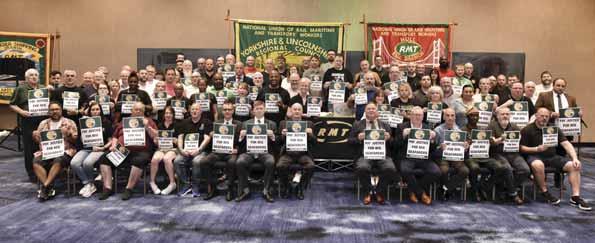

Pollard MP to discuss the longrunning pay dispute with Royal Fleet Auxiliary and the future of the RFA.
The meeting took place following the latest day of strike action, carried out on the International Day of the Seafarer on June 25, with further action planned on July 26.
However, the minister respected RMT members' decision to take industrial action over the imposition of the sub inflation 4.5 per cent increase in 2023-24 and it was made very clear that the new government is looking for a
await an offer and unless a decent offer is submitted by the employer RFA members will take a third day of industrial action.
“The meeting was a breath of fresh air, compared with the previous fourteen years of antagonism and neglect by the employer under the direction of the previous Tory government.
“The Minister was categorically clear in his instruction to his officials that RMT and officers union Nautilus must be talking to the right people in the RFA, Royal Navy and the Ministry of
Labour government is committed to working with the union and engaging constructively to recruit more Ratings in re-building the RFA,” he said.
The Minister also confirmed that the RFA would be included in the upcoming Defence Review and the union will be putting together a comprehensive case for reforms that preserve the operational flexibility of the RFA fleet whilst improving fleet readiness.
RMT national secretary Darren Procter said that RFA must acknowledge the gravity
sacrifices of merchant seafarers.
“The decline in the value of pay, pension scheme and the unequal leave ratio for a fourmonth tour is spurring a recruitment and retention crisis which adds to RFA members' workload.
“It is positive to see an increase in RMT membership in the RFA, and I strongly encourage all RFA members to actively recruit any potential members to join RMT to develop our collective strength through increased membership,” he said.
RMT has secured improved fair Olympic payments for Eurostar staff after intense negotiations and a ballot for industrial action.
The continental rail company has agreed to significantly improve premium payments for staff working during the Paris Olympic and Paralympic Games which means that the ballot of Eurostar members has ended and no dispute
now exists between the union and the company.
Initially, Eurostar proposed a shift-based payment system which RMT rejected for being divisive and insufficient. The union proposed a one-off postOlympic payment, encompassing a broader range of employees including, Assistant Duty Control Managers, rostering/planning, and
frontline contact centre roles.
Eurostar will now provide a one-off payment of at least £650 to eligible employees, replacing the shift-based system. This payment will be made in the September 2024 payroll.
RMT general secretary Mick Lynch said that this improved offer was a testament to persistent negotiations and the dogged determination of the
membership.
"We have secured a fair and adequate reward for their hard work during the upcoming Paris Olympic and Paralympic Games.
"This one-off payment acknowledges the dedication of our members during this busy period and we remain committed to securing the best possible conditions for our members across all roles,” he said.




RMT members at First South West bus company, part of the First Group, operating services in Somerset and Cornwall have voted overwhelmingly for strike action against low pay.
Over 300 RMT members took part after extensive negotiations with the company, failed to yield an acceptable offer. As a result, First South West members will now take planned strike action for 48 hours.
Despite numerous meetings, including sessions
facilitated by ACAS, First South West's proposals were overwhelmingly rejected in a member referendum.
The company's latest offer was deemed insufficient, particularly in light of First Group's recent profit announcements.
Welcoming the strong ballot result, RMT general secretary Mick Lynch, said that members had sent a clear message to First South West that they will not accept being amongst the lowest paid transport workers
in the region.
"The company's offer to hard-working staff is particularly insulting given the huge payouts given to First Group boss Graham Sutherland.
"If First Group can find £800k in bonuses for top management, they can find money for bus workers,” he said.
First South West has also announced plans to close its Helston depot in Cornwall as part of its cost-cutting plans
and transferring staff to Penzance and Falmouth depots.
A First South West worker said: "Management are using the closure of Helston to coerce staff into accepting 65p an hour more or threaten them with more closures".
RMT assistant general secretary Eddie Dempsey called on First South West to return to the negotiating table “with a meaningful offer that reflects the dedication and hard work of our members".
RMT has slammed transport giant First Group for profiteering from privatised rail and bus services across the country and recommending an increase in dividends of nearly 50 per cent.
First Group’s financial results for the year ending March 2024 state that there has been a ‘significant increase’ in Group operating
profit to £204 million – up 27 per cent from £161 million last year.
First group operates bus and rail services including Avanti West Coast – which has continued to be beset with problems during the last year, with Transport for the North calling for the contract to be terminated in March.
A final dividend per share
of 4p recommended – brings total year dividend to 5.5p per share a 45 per cent increase compared to last year. If agreed by the AGM, the final dividends totalling £24 million will be paid in August.
RMT general secretary Mick Lynch said that the fact that First Group has continued to profit whilst passengers are faced with disruption and poor
services shows why our public transport services need to be brought into public ownership.
“We need a single, integrated, publicly owned rail network, and a reversal of the ban on municipal bus companies so that our public transport networks work for passengers and communities, not profit,” he said.

RMT has welcomed Labour's commitment to advancing worker protections in the energy sector, but that it must be part of a broader Green New Deal.
Currently self-employed offshore workers face costs of up to £7,000 to obtain the necessary qualifications for both sectors, with no guarantee of employment. This issue affects thousands of workers in offshore engineering, diving, and seafaring roles, leading to financial strain and job insecurity.
Labour announced that it
would introduce a skills passport, protect offshore jobs and ensure workers can transition to a greener energy sector in the future.
The skills passport, originally outlined in the UK government’s 2021 North Sea Transition Deal, aims to facilitate employment opportunities for offshore workers by aligning training and certification standards between the oil, gas, and renewable (wind) sectors.
This commitment came about due to sustained pressure from RMT, other
offshore unions, and pro-worker green groups, who highlighted the misalignment of current training standards.
Despite the setbacks, renewable and oil and gas employers reaffirmed their commitment to the digital skills passport last month.
RMT general secretary Mick Lynch welcomed Labour's commitment to supporting offshore workers through the digital skills passport.
"However, this initiative must be integrated into a broader, ambitious Green New Deal.
"The protection of oil and gas workers’ jobs, along with the preservation and enhancement of their skills and livelihoods, must be central to this vision.
"Only through such comprehensive measures can we ensure a just transition for all workers.
“RMT stands ready to work with the new government to ensure that the digital skills passport becomes a reality, benefiting offshore workers and contributing to a fair and sustainable future for the energy sector,” he said.
Theunion marked the 36th anniversary of the Piper Alpha disaster in July, which killed 165 offshore workers and two seafarers when a catastrophic fireball that engulfed the platform on July 6, 1988.
The North Sea tragedy led to the Cullen Inquiry, which concluded in late 1990, and the government had introduced new safety regulations in 1989.
The disaster was caused by
a flawed permit to work system. Workers injected condensate fluid into a pump, unaware a safety valve had been replaced with a nonleak-proof disk. The highpressure fluid leaked, igniting a fire.
In 1997, the UK offshore industry launched Step Change in Safety. Two years later, unions reported Shell for not complying with over 60 of Lord Cullen’s 106 recommendations.
RMT general secretary Mick Lynch said that Piper Alpha still exposed the dangers of poorly regulated, profit-driven operators.
“The loss of 167 workers led to crucial health and safety laws. As we mark this anniversary, RMT calls for a review of the offshore safety regime's effectiveness.
"With rising profits, energy security issues, and safety maintenance backlogs, we need a strong safety
representative structure. Workers’ voices must be heard to honour the legacy of Piper Alpha victims and ensure North Sea safety today.
“We urge employers to allow workers to remember the 167 lost, especially in northeast Scotland.
"On this anniversary, we call on ministers to honour Piper Alpha’s victims by fostering continuous offshore safety improvements,” he said.
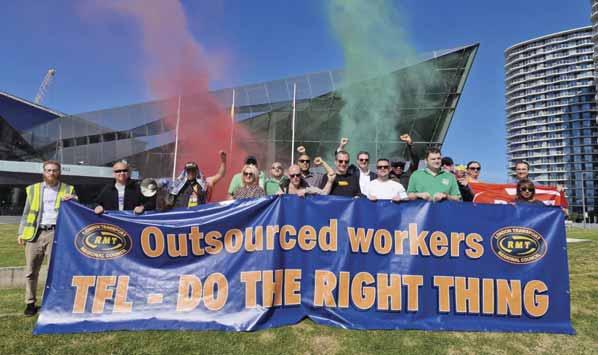
Labour’s emphatic election victory presents the union with a real opportunity to press home the campaign on insourcing - bringing outsourced workers back inhouse.
The Party went into the election with a manifesto that promised to implement the New Deal for Working People in full.
The final text of the New Deal was the subject of some pre-election debate and even though the union is not affiliated to the Labour Party, RMT recognised the importance of this debate and was fully engaged, including organising a high-profile event in Westminster at which Shadow Employment Minister Justine Madders (now Parliamentary Under-Secretary of State in the Department of Business and Trade) directly addressed outsourced workers from the RMT, Unite and PCS unions.
The final text of the New
Deal, agreed with affiliated unions, did include crucial wording on insourcing. The document said that in government Labour would ‘learn the lessons from the collapse of Carillion and bring about the biggest wave of insourcing of public services in a generation’.
This includes a commitment to ‘examine public services that have been outsourced as part of our drive to improve quality, design better services to meet changing needs, ensure greater stability and longer-term investment in the workforce, and deliver better value for money’.
An Employment Bill will be announced in the King’s Speech which will contain elements of the New Deal. In the rail sector, the King’s Speech will also include legislation that will assist the process of returning private rail operators’ contracts back into the public sector and create Great British Railways,
the start of a process of radical change on our railways which represents a significant step in the right direction.
It also presents the union with genuine opportunities in our campaign for the reintegration of public service workforces.
There is a lot to do. The inheritance of 30 years of privatisation on rail, for example, is a chaotically fragmented workforce. Each privatised train operating company (not to mention the ones already back in the public sector) has outsourced key functions it saw as ‘ancillary’ or ‘non-core’, including cleaners, caterers, gateline workers and so on.
Network Rail outsourced more than 2,000 cleaners to outsourcing giant Mitie PLC. Best estimates suggest that more than 5,000 of these ‘ancillary’ rail workers are outsourced by the train
operating companies and Network Rail.
Within Transport for London (TfL) too, over the years, supposedly ‘non-core’ facilities management functions were outsourced, leaving around 3,000 such workers employed by the likes of ABM, Mitie and Sodexo.
All these workers share a common experience: no sick pay to speak of, pitiful pensions that will leave them struggling in retirement, pay rates bunched around the National Minimum or Living Wages, long working hours and heavy workloads as companies cut headcount to sweat out profits and a working life characterised by precariousness.
Precarious work in a fragmented supply chain also pervades the maintenance and renewal of rail’s infrastructure. Network Rail’s renewals work was hived off to the Infracos in
the 1990s after privatisation. Even after maintenance was brought back in house following the collapse of Railtrack, renewals work was left to the construction companies like Balfour Beatty and McGinley who employ thousands of workers on zero hours contracts and other forms of bogus selfemployment.
The number of workers employed in this way is literally unknown, but it is thought to be in the tens of thousands.
TfL also continues to subcontract track protection and possessions to a precarious workforce employed on zero hours contracts or engaged through bogus selfemployment arrangements with companies like Morson and Cleshar. Both Network Rail and TfL are also making increased use of agency workers and contingent labour. Network Rail’s spending on contingent labour increased by 71 per cent between 2021 and 2022 to £24 million.
TfL has almost doubled its use of agency workers since 2020. As with other outsourced workers, many of these sub-contracted and agency staff live in a state of extreme precariousness. Labour’s insourcing and wider New Deal pledges address the needs of these workers.

In addition to the sheer scale of the problem, there will also undoubtedly be resistance from vested interests and those ideologically committed to outsourcing. So, the union has to hone and refine its case to counter this resistance.
That is why RMT is developing arguments around the benefits of insourcing. The union knows that outsourcing is exploitative and unfair and the evidence to demonstrate this is all around us in member reports from the frontline.
Now the union is building arguments that exposing the operational costs of outsourcing and fragmentation.
Insourced workers cooperate better, problem solve better and enable the smoother operation of the services they run.
There is also a growing body of academic work showing that outsourcing lowers workers’ productivity, while conversely, providing workers with decent contracts, job security, training and better pay can raise output. Insourcing is better for workers, better for public services and better for productivity.
Over the last few years, the union has shown that things can be won for outsourced workers, even in less favourable political contexts.
Cleaners and caterers have been brought back in house at Transport for Wales.
Thousands of cleaners in London have won travel facilities, at a time when TfL was under the financial cosh of a spiteful Tory government bent on attacking our members’ livelihoods.
So, it can be done with patient, focused campaigning, in the least auspicious circumstances. The delivery of the New Deal in full could prove transformative, changing the world of employment and giving our union the space within which we can work to rebuild the public sector workforce.
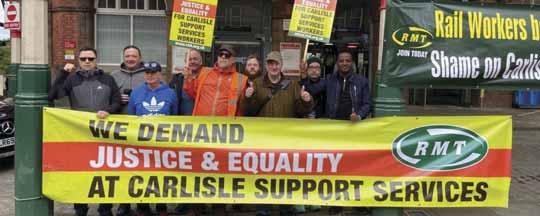

Cleaners spoke out against their super exploitation on the rail network and promised to fight back at their national organising conference in York.
Delegates from several contracted-out firms expressed frustration at a lack of sick pay, company holiday pay and the need for a strong industrial response from RMT.
Kicking off the event and giving an overview of where the Justice for Cleaners campaign stands, Senior Assistant general secretary Eddie Dempsey said: “We've been through a whole series of battles.
“We've been through battles of a combined nature in Churchill's. We’ve been through a massive fight when we tried to bring all the contracts together.
“There have been some victories, we've had some defeats, we've ran out of steam in some places.
“But the one thing I want to be keen to do is to make sure that we're learning as we go.
“And the best way to learn how to fight, on behalf of the workers is in the ring”.
He went on to highlight successes cleaners had had before Covid when they took direct action and coordinated with directly employed staff on Great Western Railway.
But when the government moved away from the franchise model and took on more direct control of the companies, the situation changed.
“The people in charge of settling deals with us were no longer the private companies,
with their own profit margins and their own public image to protect.
“The decision-making was shifted to the Department of Transport,” he said.
During the national strike which cleaning grades were part of, outsourced companies were having any loss of money underwritten when their employees walked out.
“As long as the cleaning company could demonstrate that they had a plan to mitigate the impact of our strike action, they could get paid, including bringing in agency labour in a way that was illegal to break our strikes.
“They weren't losing any money. And the train and rail companies weren't losing any money either…because the government was indemnifying
them.
“Strike action works when we are able to inflict damage on the employer, where we're able to make them lose profits.
“That's when they have to settle, and so our leverage was taken away, at a time by a government, that was prepared to support the employers against the workers and use taxpayers’ money to make sure they don't lose a penny, and that's a significant and important change,” he said.
Mr Dempsey concluded that the only way for cleaners to advance their cause for better pay, company sick pay and decent holidays was organisation and increased density. He said: “You are not paid
in this society in accordance with the value of your work. If that was really the case, then nurses would be living well. Teachers would be living well. People that contribute to society would be able to afford to buy a house, have a holiday, raise their kids and have some money spare.
“But that's just not the case. Working class people are paid on the basis of how you act in your union. People are paid on the basis of and the strength of their organisation and militant spirit.
“We need to make sure all the activists are developing, bringing more people into the shops making our organisation
stronger so that we can build up a powerful punch on behalf of cleaners in the industry.”
A number of industrial issues were raised at the conference through series of motions debated and passed by delegates.
Churchill’s cleaners working on GTR raised the issue of pay been deducted for break times certain grades within the contract and called on the union to pursue the matter with the employers.
Roy Osarogiagbon from Jubilee South Branch said: “An injustice to one is an injustice to everyone of us.”
Colin Stuart Plymouth no.1 branch delegate questioned
why the grades were segregated in the first place where some are docked pay for taking a break and others on the contract are not.
Delegates also highlighted how cleaning contractors were ripping off their staff over holiday entitlements accusing some of acting unlawfully by deducting wages.
Rebecca Stokes, Crewe No.1 branch told conference: “I raised it with my company about their unlawful deduction under the government guidance on holiday pay.
“What happens is you get paid less on the hourly rate in the first few months of the year. It is supposed to increase as the year goes on
and you will be paid higher your hourly rate.
“However, this hasn’t been the case on Atalian Servest and now OCS.”
She pointed out that eventually the union won and that the company changed their approach.
“I just want to give some hope and it is important that we read our contracts and understand what we are owed,” she added.
Amen Charles Usiomoifo, Euro Passenger Services said: “We had this issue earlier this year with some individuals going on holiday and no one gets their full holiday payment”.
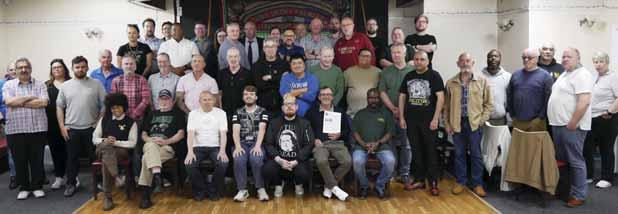
Apacked RMT South East Regional Council (SERC) meeting hosted by Tonbridge branch gave a huge welcome to cleaner Augustine Ochoa who has now returned to work after his employer tried to sack him for being an effective union rep.
Cleaner grades were a hot topic of the day as they reorganise for the fight ahead to bring all outsourced workers in house.
He was suspended for four months whilst his bosses tried build a case to justify sacking him on trumped up charges,
two of which dated back to a previous contractor three years ago.
He spoke to the full council, thanking everyone for their comradeship, support and commitment during a very difficult time for him and his family too.
He gave particular thanks to his branch secretary Dan Kennedy who committed branch resources to fighting this clear injustice.
Augustine also thanked RMT regional organiser Jon Parsons who represented him throughout.
"I am deeply humbled by and grateful for the solidarity of my union, my comrades and my friends which helped to stay the course, when you attack one you attack all of us,” he said to an emotionally charged standing ovation.
Another key focus was organising and recruitment and supporting branches and sharing experiences about what works well.
SERC president Ivor Riddell said that the key was keeping recruitment and organising as the main issue facing the union.
“We need to focus on what makes this union a serious industrial force, for its members,” he said.
The meeting also heard reports from the NEC member Dan Gibbons and Jon Parsons and most branches and grades were there to discuss issues from pay, terms and conditions and jobs.
The meeting also welcomed the fact that East Kent branch was hosting the young members advisory conference next year in Canterbury. The regional council meets on a quarterly basis the week after the NEC stats week.
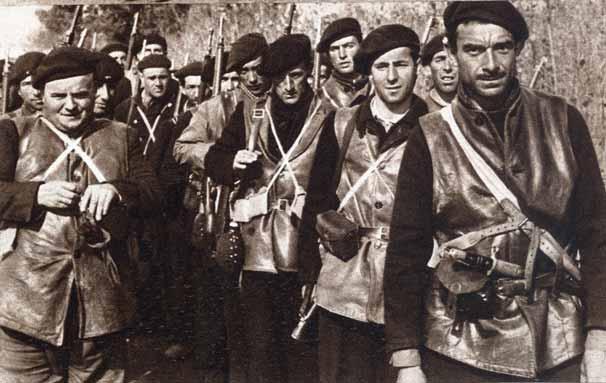

They say the past never goes away and is still with us. That couldn’t be more true of the rise of fascism in the last century.
Everyone hoped this evil creed had been stamped out for good with the defeat of the Nazi war machine in 1945. But the fascist beast and its toxic ideology of race-hate, militarism and hostility to organised labour has not gone away.
Sadly, this makes a new booklet jointly published by RMT and the International Brigade Memorial Trust (IBMT), ‘They Shall Not Pass’, all the more relevant and important today.
It tells the story of the railway workers and seafarers who in the 1930s resisted fascism at home and, in the case of the Spanish Civil War, took up arms to stop Hitler, Mussolini and General Franco
crushing the elected government of Spain.
What stands out is that these workers recognised the true threat of fascism well before their political masters did.
It was ordinary people who stopped the British Union of Fascists (BUF) from marching through our towns and cities.
And it was ordinary people, including over 100 members of the NUR and NUS rail and seafaring unions, who joined the International Brigades to fight the fascists in Spain. There’s a plaque dedicated to them proudly on display at RMT’s head office.
Within the British establishment there was considerable sympathy for the way Europe’s fascist dictators banned trade unions and violently suppressed political parties of the left.
BUF leader Sir Oswald
Mosley was an aristocratic former cabinet minister with rich and powerful friends.
As ‘They Shall Not Pass’ reveals, Britain’s would-be führer came unstuck when he sued NUR general secretary John Marchbank for slander.
The BUF leader won a
technical victory but was awarded a laughable farthing (a quarter of a penny) in damages.
Mosley’s High Court humiliation came in 1936. Things got worse in October of that year at the Battle of Cable Street. This was when
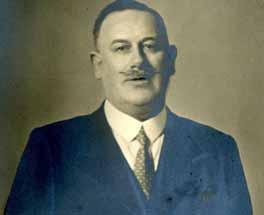
the Jewish population of Whitechapel joined forces with local dockers, trade unionists, communists and socialists to prevent the BUF’s antisemitic Blackshirts from parading through London’s East End.
The cry of the anti-fascists was ‘They shall not pass!’, the same one used by the defenders of Madrid, ‘¡No pasarán!’. Many of the protesters at Cable Street were among more than 2,000 volunteers from Britain who joined the International Brigades to fight in Spain.

More than 500 of them made the ultimate sacrifice.
NUR member Ginger McElroy from Wishaw was killed at the Battle of Jarama in February 1937 after being hit by a dumdum bullet. The bloody battle saw the British Battalion lose more than 150 men. But they held the line to stop Franco taking Madrid.
Fellow rail workers Alwyn Skinner from Neath lost his life in the Battle of the Ebro in the summer of 1938, when Hitler’s bombers pummelled the British Battalion on the rocky slopes around Gandesa. The
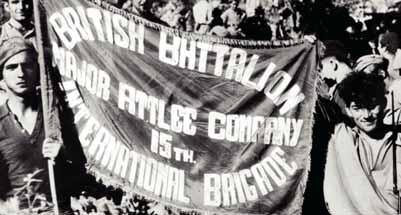


battalion suffered 90 fatalities.
Readers of the booklet will be moved and inspired by the exploits of many individuals described in it.
Jimmy Prendergast, one of the leaders of the Irish contingent in the International Brigades, fought bravely at Córdoba, Jarama and Brunete.
In the 1960s he was the NUR’s Marylebone branch secretary and led the campaign that broke British Rail’s colour bar that excluded black workers from senior posts.
Jack Coward, one of several Liverpool seamen to fight in Spain, was captured at Calaceite in 1938 but escaped
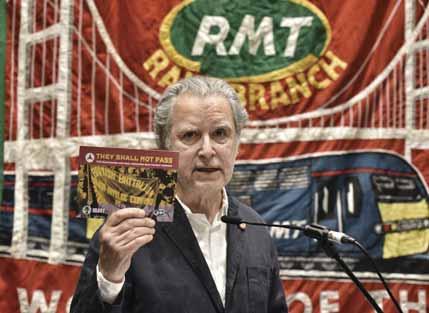
and fought behind the lines with Spanish guerrillas. When he was re-captured, he pretended to be deaf and dumb and eventually made his way home from enemy Spain on a British ship.
Spike Robson, a ship’s fireman from South Shields, led the NUS crew of the Linaria on strike in Boston, Massachusetts, to stop explosive materials being shipped to Franco’s Spain. Arrested on their return home, the men ended up in court, charged under the Merchant Shipping Act and facing prison sentences. Robson was blacklisted from the shipping industry as a result
It is often said that trade unionists stand on the shoulders of giants – in other words our predecessors who fought for the rights we enjoy today and the principles that still guide us. Delve into this booklet and meet some of those giants from the union’s past. Copies are available for sale for £5 plus P&P in the webshop on the RMT website, go to https://www.rmtshop.org.uk/books/they-shallnot-pass-book
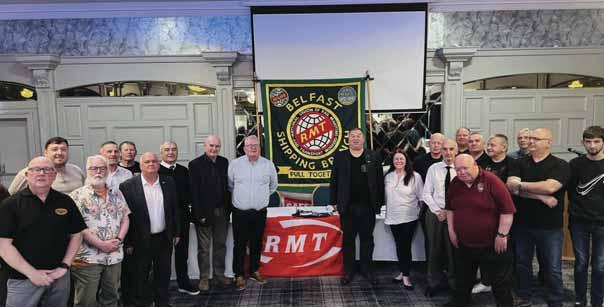
Delegates to the union’s biennial general meeting (BGM) of shipping and docks grades in Belfast with a packed agenda of motions, reflecting the wide range of changes and challenges facing maritime and port workers.
Delegates from Glasgow, Eire, Liverpool, Holyhead, Southampton, Dover, Oban and Portsmouth were supported in their endeavours by the hosts Belfast Shipping.
RMT general secretary Mick Lynch kicked off business setting out the seriousness of the union’s position in the maritime and docks sector.
“There is no getting away from the urgent need to boost density and get into new workplaces as the industry changes in ways that will affect jobs,” he said.
Subjects including employment conditions, training, improving our members work-life balance, pensions, boosting social security rights, seafarer safety on passenger ferries, improving mental and physical health and access to medical services for seafarers were all raised and debated in depth
by delegates.
The union’s priority is organising seafarers and port workers across all sectors. Mick Lynch, RMT national secretary Darren Procter and assistant national secretary Mark Carden all made clear in their addresses to delegates that RMT’s aim is to increase membership as part of the organising model the union is developing.
New delegates from Stena Line in particular, where improvements have been made since the P&O scandal, made valuable contributions. This includes the new Stena Line convenor Michael Hobson who introduced himself to delegates following his recent election to the position.
RMT policy is for maritime cabotage laws to protect training, employment and the domestic register on coastal and offshore shipping routes.
An online presentation to delegates from Chris Given, of the Seafarers International Union (SIU) of Canada, provided inspiration to the current generation who face unfair competition from exploitative employment
practices on coastal routes.
Mr Given, who is also Chair of the ITF Cabotage Task Force, outlined his union’s successful approach to cabotage in Canada with government and employers support to protect Canadian Ratings and Officers from undercutting by shipowners and offshore crewing agents.
A menu of conditions on visas to work in Canadian waters were at the heart of the SIU’s approach giving delegates a clear picture of what cabotage means in practice for seafarers in coastal trades.
RMT president Alex Gordon spelt out in a comprehensive analysis of the industrial and economic conditions that were driving the current crisis in the global capitalist economy.
“Seafarers and dockers are at the forefront of these challenges and need strong union representation that comes with high density and consistent engagement with employers, governments and the ITF,” he said.
Darren Procter reminded delegates of recent agreements reached between
the union and the Maritime Union of Australia as a concrete example of the international dimension to our collective endeavours.
“Political turbulence in the maritime economy, whether it’s in the North Sea or the Red Sea only serves to underline RMT’s case for a huge increase in Ratings in membership working across all sectors of the shipping industry,” he said.
New and experienced BGM delegates sparked healthy debates over the future of the maritime industry, including the RMT’s own position on the recruitment of foreign ratings into the union, a subject the BGM sent to the union’s annual general meeting for consideration, along with employers’ exploitation of meal breaks in hours of work and rest.
These productive discussions, chaired by RMT’s well respected CalMac Convenor, Brian Reynolds, saw delegates return to work revived and renewed for the industrial and political challenges that lay ahead for a fighting maritime union.


RMT must maintain its organisation, combative spirit, and its ability to fight, no matter who is in government, RMT general secretary Mick Lynch told the union’s AGM in Hull
Mr Lynch who has led the union since May 2021, praised RMT members for their steadfast resilience in the national dispute which saw deals done that involved no changes to terms and conditions.
“We have been in big, tough disputes – created, sponsored and funded by the Tory government.
“But we are fighting and winning, and we will continue on that path.
“Last year the challenges were piling up, with our members and our union being attacked on all fronts.
“The ticket office closures were meant to be the government’s knockout punch in the rail dispute.
“Closing the offices and imposing thousands of job losses and changes to conditions.
“But they overreached, and we defeated them,” he said.
In a strong message to the incoming government following the Labour victory, he said that prior to the result: “Our message is this – put down straightforward, nostrings proposals, and let’s see if we can make a deal.
“We are still on a dispute footing, so settle our pay deals, leave our contracts, conditions, agreements and pensions alone – they are not for sale.
“Don’t create disputes as your predecessors did, get the deals sorted, let’s re-start industrial relations on a good footing, and then let’s move into a period where we can construct the publicly owned railway the country needs,” he said.
Despite the recent attempts by the Labour Party leadership to water down aspects of the New Deal for Workers, Mr
Lynch was clear that the proposal "will be significantly beneficial, including employment rights from day one and repealing the 2016 Trade Union Act.
"The rail policy document promises to change the industrial relations framework, ending the attacks on us and providing for decent conditions, regarding the railway workforce as an asset to be nurtured rather than a cost to be cut."
While congratulating deputy leader Angela Rayner and Shadow Transport Secretary Louise Haigh, Mr Lynch did caution that, the election of a Labour government was the "beginning and not the end" of the union's struggle.
"We know that big business and the corporations are all over Labour.
"They will be doing everything in their power to dilute, delay and destroy these policies, not just over the next five years but over the next ten.
"So, we must be prepared for a decade of struggle under a Labour government," he said.
Looking ahead to the next five years, Mr Lynch promised to put the union to the "front rank" of the trade union movement and to "inspire others" to change society.
"This political and economic consensus must be smashed, and Labour must produce an alternative economic and industrial policy, because what they are currently offering will not fix the problems.
"Now is a time for change, but we, the working people, have to build it,” he added.
Reflecting on RMT’s leadership role within the
strike wave which began in 2022, President Alex Gordon said that the union had “lit the blue touch paper for an organised working-class fightback” which spread across several industries and sectors.
Mr Gordon who is coming to the end of his three-year term as president, praised members for making the union the “embodiment of militant working-class industrial organisation.”
“Since the last UK general election in 2019, three Tory governments have tried and failed to destroy our union.
“They failed to intimidate
our members, or our leaders. They failed to dent our fighting ability and in 10 days’ time their government is going to be put into the dustbin of history by voters massively rejecting them at the polling booths.
“We are the union that knocked the legs out from under that fake ‘man of the people’, Boris Johnson so his own MPs in their wisdom replaced him first with ‘Lettuce Liz’, and then with ‘Rishi Rich’,” he said.
There were several key industrial issues for members



which brought delegates to the rostrum in their droves, including staff assaults, AI developments in the workplace and conditions of work in the bus and maritime sectors.
Staff assaults on the railway has been a growing problem, and delegates unanimously agreed RMT would convene a summit of unions, employers and police in a drive to tackle assaults on railway workers.
In a sobering session, several delegates gave harrowing testimony of either being assaulted or being aware of colleagues suffering attacks across the railway.
Mandy Evans, Swansea No.1 told conference: "We've had two serious assaults in Swansea in the last two years."
Giving details of her own difficult experiences on the railway, Ms Evans went on to


talk about a colleague who after being viciously attacked following a ticket inspection, is now looked after by his wife as his full-time carer.
"The girl who did it is still allowed to travel on our trains every day.
"This is very serious, and I wholeheartedly support my brothers and sisters in bringing this motion forward," she said.
Nigel Holden, Leicester and

Rutland pointed out that many assaults are going unreported so the true number will be much higher.
"When an assault does occur don't expect any support from the British Transport Police," he warned.
Several delegates raised cuts to the BTP as a reason why they did not always attend incidents because they are under resourced and short staffed.
Mr Holden added: "A guard colleague of mine called 999 twice after he was spat at and threatened on a train. No one attended."
Ebony West-Kingston, Neasden branch said: "Many of my shifts are lone working, so for the majority of my shifts, I am on my own.
"If I do find myself in a situation where I am physically assaulted, I have to call the police. And the constant cutbacks on BTP are horrendous. If things are not improved or sorted out soon, we could see people losing their lives".
Delegate Mick Ramsey, Southwest Midlands said that railway workers not operating on trains or stations can still be attacked while going about their duties.
"I attend infrastructure faults on the track and that includes level crossings which fail often, as a lone worker, I
Jam having to deal with agitated drivers who cannot get to their destination. And we're the first person to get it in the neck," adding that he himself was assaulted a few years ago.
He went on to say that he believed funding for police was going into the armed response units rather than BTP specifically.
Another challenge facing the industry is Artificial Intelligence (AI) and how it impacts on railway workers.
Conference agreed to draw up an industrial strategy to deal with the rise of AI on the railways.
The union will now go and assess the threat from AI in workplaces where they organise, seeking proactive collective bargaining agreements that enshrine human accountability for management decisions and recruit new types of rail workers that use AI within the transport system.
In a tightly debated motion, delegates found themselves tied 36 for and 36 against with one abstention.
Under the constitution of the union, president Alex Gordon had the casting vote which he made in favour of passing the motion.
Moving the motion, Sarabjit Gill, Paddington No.1 branch said ever increasing large data sets within AI meant that we need to assess the threat to workplaces.
Supporting the motion, Adam Owen, Holyhead No.1 said: "AI enhances the data it uses to make a decision. So, if the data is wrong or corrupted, expect issues within the workplace where it is used.
"Please support this resolution so the union can have the tools to combat the power companies have in the digital age."
Some delegates raised concerns about possible rule changes that maybe needed and could impact how the
union is organised.
Speaking during the debate, senior assistant general secretary Eddie Dempsey made it clear this was not an "enabling motion" for any backdoor organisational re-structures of branches and regions.
"There is a shift going on in the industry from the traditional industrial power in the operational grades of the railway to more digital functions.
"It is also important we understand the opportunities these types of technology present the union and use it to our advantage," he added.
Another group facing challenges particularly from rotten private sector employers is bus workers who have been staging numerous industrial actions throughout the last 12 months.
Two motions were unanimously passed, seeking to change the law around driving hours and create a standard set of terms and conditions for all bus workers regardless of the company they work for.
The union wants to amend the law to make it a requirement for bus drivers to take a break after "five and a half hours of duty".
Currently breaks are calculated based on driving a bus specifically.
Lee Rundle, South Devon Bus branch said that companies were squeezing drivers and bending the rules.
“There are technicalities there, which we want to tighten up and make sure are watertight".
Pointing out that the 80s saw massive changes for bus ownership, he said: "There's lots of operators out there.
"Back in the 80s, Thatcher and her government broke up the bus industry, took it away from being nationalised and sold it off to individual operating companies".
Mr Rundle added: "We are





organised, and we are coming for them because we want our people to have quality of work but also the ability to be able to go home and be rested.
Supporting the resolutions, RMT assistant general secretary Eddie Dempsey praised bus workers for taking a stand adding: “This is a classic class struggle item. We will get the lobbying going but we must be mindful the employers will resist changes to the regulation because we are eating into their profits”.
RMT members are continuing to fight back in the maritime sector over two years after the P&O mass sackings scandal.
The union’s conference called for inclusive meal breaks as part of 12 hour shifts in the maritime and offshore industry.
Moving the motion, Humber Shipping delegate Bill Jones said: "You effectively work a 13-hour day because your meal breaks are not included.
"On some occasions ships are short staffed or there is bad weather, leading sometimes to 15-hour shifts and this needs to be addressed.
"If we are going to give the time, we need to be properly compensated."
Marc Boal, Aberdeen Shipping pointed out such long shifts without adequate breaks and time off has detrimental effects on seafarers’ mental health.
"We have to hold these companies to account. We are struggling to fit in safety drills as a result," he said.
RMT national secretary Darren Proctor supported the motion adding: "Within the ferries sector and the offshore sector, you would have one week on and one week off. That is becoming less common.
"We are not seeing a uniformed approach in the sector.
"More and more pressure is being put on staff so, we need fatigue management plans put in place," he said.
Cleaners, caterers and other facilities management staff have been at the sharp end of major industrial campaigns and strikes over the last year in a bid to improve their terms and conditions against some of the most repugnant employers on the railway.
Conference delegates showed solidarity with their colleagues declaring outsourcing “abhorrent” and wanting to keep the pressure up on all outsourced workers to be brought back in house.
Euston No. 1 delegate James Lynch slammed the outsourcing companies in catering for running such “unethical workplaces” and that their motivation was to be “cost effective” for their own business interests.
“We need to enhance our campaigns to end outsourcing and work towards its abolition from our industry,” he added.
Speaking on behalf of the top table, assistant general secretary John Leach pointed out that these companies were not running the services “on a charity basis” and were in fact making huge profits which often leaves the industry and goes into shareholders pockets “at our members expense”.
“Labour have made a commitment to insource and we will hold them to account on that,” he said.
Claudia Chianese, Manchester South said that members in outsourced companies prevalent in the station, cleaning and catering grades faced the most draconian divide and rules tactics imaginable.
“We have seen a renewed fight among workers in outsourced companies and they need the solidarity of members directly employed
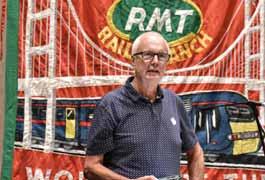

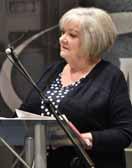
by train operating companies,” he said.
Rebecca Stokes, Crewe No 1 said that ultimately outsourced jobs need to be brought back in-house.
“We have seen what the scourge of outsourcing does, bringing down terms and conditions and poor pay,” she said.
Every year, the John Cogger Award is given to a young RMT member who has made a significant contribution to the union in the last 12 months.
This year, Kierin Offlands won the award for all his hard

work in winning ballots and his dedication in supporting members to beat the antitrade union laws.
He told RMT News: "It is a real honour to win this sought after award. The union always punches above its weight and young members are right now, making an incredible contribution to winning in the workplace".
Alongside AGM, young members were attending a wide-ranging course on RMT's structures, political education and taking inspiration from the international socialist movement.
Speaking ahead of the





recent general election, young members chair Sarah Cundy said that RMT does and should have a really leading role in the political voice of the trade unions, which it does at the moment.
Ms Cundy said that Labour's promises of public ownership of rail, if carried out, will have a "generational impact".
Ms Cundy went on to say that political education and knowledge of the union's structures for reps and members does not happen automatically.
"To be a good rep, you must have knowledge of the structures. If you have an issue at work and you exhaust local avenues for resolution, and you know how the union fits together, you can go to your branch and put forward a motion right to the very top of the union and even bring matters to AGM," she added.
Rhys Harmer from LU Fleet who is involved in teaching the young members course, said: "Privatisation happened before I was born.
"I started working when I was 16, every pay check I've had, every bit of tax I've paid, has been under a Tory government.”
Young members vice chair Freddie Seale spoke to young conference attendees about his experiences on a recent trip to Cuba.
"It was inspiring to see a country that is developing and running itself along socialist rather than capitalist lines," he said.
Solidarity with those fighting oppression internationally was high on the agenda at the AGM, with support expressed for the people of Palestine, the urgent need to prevent nuclear war and an emergency motion supporting striking oil workers in Iran.
On Palestine, general secretary Mick Lynch said:
“Our movement must always loudly demand justice for the Palestinians in a sovereign state, and liberation for all those fighting oppression, inequality, and occupation.”
President Alex Gordon also pointed out that Britain must stop arming Israel, adding: “RMT calls for an end to British arms sales to Israel and an immediate cessation of hostilities and peace negotiations to establish a Palestinian state.”
On conference floor the union backed calls for a boycott of Barclay’s over the bank's investments to weapons companies who are supplying Israel to destroy Gaza.
The union also said it would commit itself not to use Barclays services and to make sure they do not invest in shareholdings and other investments.
Going forward RMT will write to Barclays calling on them to end their financial ties with Israel.
Kings Cross delegate Annila Saghir said: "We need to support this motion because the power of collective action and supporting human rights can lead to positive change.
"Palestine is a trade union issue and we must act now."
Mark Hall, Wakefield and Healey Mills said that by investing and servicing these arms companies, Barclays was directly profiting from Israel attacking the Palestinians.
He went on to say that thousands of customers had cancelled their accounts at Barclays and that a boycott would have a significant impact.
Alongside escalating war in the Middle East, scientists have said the Doomsday clock has moved to 90 seconds to midnight which means the world is the closest it has ever been to nuclear catastrophe.
Supporting a successful motion: “Peace is a labour movement issue,” Eddie
Dempsey called on the British government to work towards peaceful and diplomatic solutions to current conflicts.
He told conference: "We saw a series of wars where the United States sought to remake countries across the Middle East and Africa in its own image.
"Now we're in a different period. In the last few years, it's become apparent that there were other great powers in the world. The rise of China with its huge economy and population and greater and greater ability to build military resources.
"And then of course there is Russia, remilitarising and having the largest nuclear arsenal on the planet.
"We are now in a situation very similar to WW1 but with powerful nuclear armed states".
With war in Ukraine and the Middle East continuing to escalate, Mr Dempsey said: "All of these things could get out of hand very quickly. We are so close to extreme war between major powers.
"It beggars’ belief that the political class and the press don’t seem to take any notice of this."
Reiterating the union's commitment to peace, he said: "Trades unionists should always be on the side of peace and against war. It always the working class that is asked to pick up the gun and die for their country.
"It is always the working class who suffer the most, who are turned into refugees, who see their livelihoods wrecked.
"War is disgusting. It is terrified children, its people fleeing and its big money for the big corporations,” he said.
The wide-ranging motion which was unanimously passed noted Tory plans to radically increases arms expenditure and how the right to attend peace protests was being undermined, with activists being labelled "terrorist sympathisers."
Speaking on the motion, Nigel Holden said: "It is repugnant we are spending money on arms when councils are going bankrupt and youth
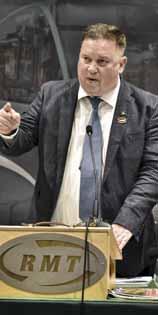
services in many cases no longer exist".
During conference, the union also expressed its solidarity with Iranian oil workers after they began strike action on June 19.
Initiated by the unofficial Council for Organising Oil Contract-Workers' Protests, the workers are calling for better pay and improved safety.
Conference was treated to a range of international guest speakers including US transport workers leader John Samuelson.
Mr Samuelson is International President of Transport Workers Union representing 150,000 workers across the airline, railroad, transit, universities, utilities, and services sectors.
Assessing the current US President's record, Mr Samuelson said: "Joe Biden has done more for transport workers than any other President in history. And I think he will win in November"
He labelled Republican presidential candidate Donald
Trump "disgusting" but admitted that the former TV show host "gains ground because institutionally the Democrats suck."
"They are a party of big business elites and social liberals and do not represent blue collar America," he said.
Mr Samuelson emphasised how difficult it was for trade unionists to organise in the US especially in the South but that his union was making progress.
"We have developed a pro worker programme including protecting our jobs particularly from being replaced by AI," he said.
"However, when you organise in the South, the cops, government and politicians are in it together to break worker organisation.
"Big chunks are like the confederacy. I turn up to a workplace with my Brooklyn accent and there are cops right there!"
Outgoing Labour MP and RMT Parliamentary chair Ian Mearns

thanked delegates at the AGM for their campaigning efforts, after receiving the union's prestigious gold medal.
Mr Mearns who represented the Gateshead constituency has been a stalwart for transport workers, playing a crucial role in advocating for RMT in Parliament.
In an emotional address, he said: "I never saw myself
becoming an MP. In 2010 my constituency went through a democratic process and selected me to represent my hometown.
"It has been a great honour to represent my hometown and to be your parliamentary chair."
Mr Mearns chided Prime Minister Rishi Sunak, strongly suggesting that the only reason he called an early
general election and progued parliament in two days, was to prevent further letters from Tory MPs calling for his resignation.
He added that it was vital a Labour government was elected despite the fact their manifesto was not perfect.
"The imperative at this election is to get the Tories out," Mr Mearns urged prior to the general election result.
"I know the manifesto is not as enticing as I would like it to be. But it simply has to be better to end this Tory psycho drama”.
Giving the thanks of conference to the contribution of Mr Mearns, Dorset Rail Branch delegate Jim Buchanan heaped praise on the former MP as a committed fighter for transport workers.
RMT general secretary Mick Lynch presented Kierin Offlands with the 2024 John Cogger young members award at AGM for outstanding service to the union.
Kierin has been heavily involved in the union's peerto-peer texting operation across multiple national rail and Network Rail ballots, London Underground ballots and a national cleaner's ballot, which included leading a team of activists who were engaging with members during the ballot period.
He is a local health and
safety representative, seconded as a local industrial rep and a branch delegate to the national Young Members' advisory committee.
He is also active in his local Trade Union Council, and chair of his regional TUC Young Workers' Forum having worked to re-establish it.
“Kierin has worked tirelessly for the union including recruiting over 100 members on Southeastern Trains.
“He is a credit to the young members committee and to the new generation of trade unionists who will, I am sure,
RMT delegates were addressed by Palestine Solidarity Campaign director Ben Jamal chair who thanked the union for its support and solidarity over many years.
He gave a harrowing account of the genocidal attacks on Palestinian enclaves of Rafah and Gaza including the fact that 20,000 children are missing.
“We are calling for an immediate ceasefire and an end to arms sales to Israel. This genocide did not begin in October but has been going on for 76 years.
“We must end the complicity of this country and the corporations that profit from the occupation, our government that still refuses to hold Israel to account, and the media that does not report the truth. And we are building a mass movement for Palestine in the UK.
“The more of us standing together, raising the call for justice and equality, the louder our voice. We know that united we can take on the might of governments, corporations, and the media –and we can win,” he said.

keep our union is in good hands,” he said.
James Lynch said that Kierin had inspired and motivated those around him and was an example of how youth was not a barrier to
organising workers. Wale Agunbiade, East London Rail said that Kierin had the ability to listen which was often a rare and invaluable talent.
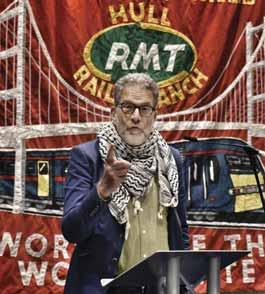

Atthis year's AGM in Hull, the RMT young members advisory committee ran its annual week-long course on the history of the labour movement, the democratic structures of the union and organising the workplace.
This was run alongside debates on the union’s history in the AGM taking place next door giving delegates on the course an insight into the importance of who decides the union’s future and how to be a part of the democratic structures moving forward.
The course was run by young members chair Sarah Cundy and the previous chair Rhys Harmer who delivered important information on the history of the union and the struggles along the way to
give delegates an understanding of why their workplace looks like it does today.
Jonathan White from the RMT policy department delivered a lecture on public ownership, what a Labour Party could deliver and the potential limitations its plans for rail plan could be. This made for a good debate on
how activists organise nationally and the potential to pressure the Labour Party on the need for full public ownership of transport modes.
The young members advisory committee also congratulated Kierin Offlands, winner of the 2024 John Cogger award. Young members chair Sarah Cundy said that his work on
ORGANISING FOR THE FUTURE TODAY
CALENDAR FOR RMT YOUNG MEMBERS FOR 2024 AND 2025 2024
organising pier to pier messaging for balloting in the national and LUL dispute had been relentless and had no doubt inspired young workers to get involved not just in their local area, but nationally.
If you are under 30 and would like to get involved in the work of the young members advisory committee, please contact ymchair@rmt.org.uk
RMT branch youth officer, what is the role and how to apply it in the union Online August 13
Introduction to trade unionism at the Marx Memorial Library October date to be confirmed 2025
Young members conference in Canterbury February 21/22
Women in the workplace May - date to be confirmed
RMT young members course at AGM in Glasgow June 23/27
Durham miners political school day before Durham miners rally
Introduction to trade unionism at the Marx memorial library October date to be confirmed
RMT young member Taylor
Beal has been newly elected as workplace representative for Gemini rail at Wolverton.
The 23-year-old has been working at Gemini for just over a year, as a welder and a shunter and she relished the chance to represent her workmates.
“I have always been a hands on kind of person, and enjoy a challenge.
“The reason why I have decided to become a union representative is because I would like to express other people’s concerns, as well as my own, in order to make the
workplace a more fair and comfortable place to work.
“I also hope to inspire other women in the industry to step up and find the confidence to voice their opinion,” she said. Taylor is the very first female ever representative in the depot.

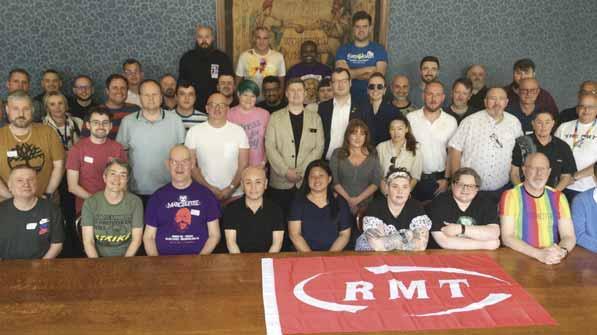
to the lesbian, gay, bi-sexual and trans (LGBT) advisory committee meeting in Manchester received an invitation to get involved in a new collecting project to record the voices of railway workers from the LGBTQ+ community for the first time.
Alison Kay, archives manager at the National Railway Museum, introduced the project called People, Pride and Progress, which will create up to 70 oral history interviews with people from the rail industry to document their experiences and to fill a gap in railway knowledge before it is lost.
The rail industry has changed from an often-hostile environment for LGBTQ+ employees in the 19th and much of the 20th centuries to a much more diverse and accepting industry, but as a result of historic prejudice,
information is not readily available, and few personal records exist.
The project is expected to run until November 2025 and interviews will be added to the museum’s permanent collection and updates and results will be shared with the public throughout the project.
Alison said that the huge shift in attitudes in society and the rail industry over the last 50 years is significant.
“These changes have not been recorded and risk being lost unless these voices and stories are recorded now. Our work will be guided by the LGBTQ+ community and the rail industry and will enhance the national collection and our understanding of railway history,” she said.
For more information, visit the museum website: www.railwaymuseum.org.uk
RMT assistant general secretary Eddie Dempsey said
that the trade union movement should be playing a unifying role in society.
“We need to be breaking down issues that may divide us and creating the conditions for working class unity.
“Regardless of where we come from and what community we represent we need to be binding together to campaign for the common good of everyone in the country,” he said.
He outlined how the Tories had attempted to destroy RMT by attacking ticket offices, the role of the guard and pensions but had failed.
“We will be having an election this autumn and we need to be lobbying the Labour Party to act in the interests of workers in Britain.
“Whatever government comes to power it is clear that rail privatisation has failed, and a change is coming. We need to be arguing for common
contracts, travel facilities for all and decent pensions to attract people into the industry,” he said.
Local Labour councillor Sam Wheeler outlined the links between the gay community and trade unionism when he addressed delegates.
“As an active trade unionist, I know that trade unionism is a form of love for our fellow workers.
“We stand together on the understanding that we will back each other up when we get into trouble and when we want to achieve better conditions together,” he said.
TUC equalities officer Quinn Roache said that trade unions needed a more constructive relationship with the next incoming government.
“We need an end to hire and fire, more insourcing, removing anti-trade union laws and decent working conditions,” he said.
Chloe of Young Labour said that educating trade unionists about LGBT matters was really important which needed funding.
“We need a more inclusive approach in adult education,” she said.
Alex Charilaou, Labour for Trans Rights said that hate crimes against trans people was on the rise.
“Our community is under sustained attack from politicians and the media,” he said.
Tom Montrose-Moss of the LGBT Foundation outlined the work of the organisation which campaigns for a fair and equal society where all LGBT people are able to reach their full potential.
Tom outlined the impact of the work the foundation does providing direct services and resources to more LGBT people than any other charity of its kind in the UK.
Support services include substance misuse, domestic

abuse, sexual health testing, talking therapies, wellbeing, community safety, trans advocacy, LGBTQ+ armed forces/veterans, smoking cessation and the Indigo Gender Service.
Tom outlined the positive impact these services and encouraged members to visit their website https://lgbt.foundation
Delegates discussed the contents of the forthcoming LBGT charter and broke into groups to come up with ideas for content before getting to the design stage. Next year’s
conference will take place in Poole.
Conference delegates backed a motion calling on the union to stop using gender-specific terms as forms of address and instead consider replacing this with non-gendered terms such as friend, colleague or comrade at union meetings.
Delegates unanimously called for all RMT documentation to adopt the use of non-gender specific terms of reference and address.
Martin Duncan, Perth No1
said that the feeling of being excluded or ignored as a group can be harmful, demotivating and extremely frustrating especially when you perceive the ‘fix’ to be so simple.
“This terminology is out of step with modern society, fails to acknowledge the diverse gender identity of LGBT+ members and may serve to inadvertently misgender or exclude trans and non-binary members or members who would prefer not to be addressed in gender terms,” he said.

The Past We Inherit, The Future
We Build” - the motto of the Durham Miners’ Gala - was on everyone’s lips at this year’s Big Meeting, nine days after an election that swept the Tories from power.
2024 marks forty years since the year-long miners’ strike. We have unfinished business.
Labour’s election manifesto promised “to ensure, through an investigation or inquiry, that the truth about the events at Orgreave comes to light”.
On 18 June 1984 hundreds of miners’ pickets at Orgreave coking plant near Sheffield were brutally attacked by police in a military operation.
Tory Home Secretary, Amber Rudd rejected calls for an inquiry in 2016, saying it would not be in the “public interest”.
An end to fourteen years of Tory corruption, but Keir Starmer’s Labour government has pledged to maintain many Tory policies, including the twochild benefit cap, which restricts child tax credit and universal credit to the first two children in a household.
This policy punishes working
class kids and families, while private schools get charitable tax breaks. It is pleasing therefore, that RMT Parliamentary Group member, Kim Johnson, MP for Liverpool Riverside, says she will move an amendment to scrap this disgusting policy when Labour Chancellor, Rachel Reeves’ proposes her first budget.
At Durham Miners’ Gala, RMT banners from as far away as South Wales, South West England and London & Anglia lined up with RMT’s National Women’s Advisory Committee, behind RMT Newcastle branches and RMT North East Regional Council banners.
Eighteen RMT banners were on display at Durham this year along with flags, friends and families taking part in the inspirational annual celebration of working class pride and culture.
In 2025, we must turn out at least twenty five RMT banners. So, start planning now.
Led by the magnificent RMT Fishburn band, we marched through Durham behind the National Union of Mineworkers
(Durham Area) Fishburn Lodge banner to applause and even tears from onlookers.
If you’ve never experienced the raw emotional power of marching with a brass band, then come to Durham on the second weekend in July next year. Join us as we march behind the RMT Fishburn band.
If you can’t get to Durham, you can join the RMT band the following weekend at Tolpuddle Martyrs’ Festival in Dorset, or Burston Strike School Festival in Norfolk on the first weekend in September.
Trade union festivals are an opportunity for conversations across the Labour movement.
In Durham, RMT General Secretary, Mick Lynch spoke at a fringe meeting alongside, ASLEF’s Mick Whelan, FBU’s Matt Wrack, Fran Heathcote from PCS and Labour lawyer, John Hendy KC on the fight to restore trade union and workers’ rights under a Labour government.
The meeting organised by the Campaign for Trade Union Freedom and the Institute for

Employment Rights was clear that we must be unrelenting in our pressure on Labour to repeal anti-union laws and introduce workers’ rights from day-one of employment. But that is not enough. We will not trade off our demands for better pay and conditions against legal reforms. We don’t just want more cake. We want the whole bakery. The long fight to keep the demand for trade union freedom as the central demand of our movement owes a great deal to stalwarts who kept the fire burning over the past forty years of attacks on our unions.
I remember attending the launch of the United Campaign to Repeal the Anti-Union Laws in the early 1990s with Bob Crow and Tony Donaghey (RMT Executive Committee members at the time). As the song goes, “It’s been a long time coming, but I know that a change has got to come.”
Alex Gordon
RMT members enjoy full representation in compensation cases without legal fees
An RMT member who suffered ligament damage when he twisted his angle stepping on a tool at the bottom of a set of stairs has successfully secured compensation from his employer.
The train maintenance employee had been working a normal shift as an engineer when the incident occurred whilst carrying out repairs in the pit underneath a train.
As he had made his way along the pit, he came into
contact with a flange lube stick which moved under the force, causing him to twist his ankle and fall forwards. The member suffered painful injuries as a result and sprained the ligaments in his left angle.
Following the incident, he instructed workplace injury experts at Thompsons Solicitors to bring a claim for compensation, arguing that the pit floor should have been clear and free from obstruction
and more could have been done to protect him.
Whilst the company initially denied responsibility so formal legal proceedings were issued. through his RMT membership his legal team were able to settle the matter out of court. The engineer has since received a compensation care package worth £14,500 which reflects the pain and suffering that he experienced, as well as his loss of earnings during his recovery period.
An RMT member who suffered painful injuries when he slipped on ice in a staff car park has received a compensation care package. The member was injured while exiting a car onto a designated walking route and stepped on to ice with his right foot causing him to fall landing on his back and right arm, causing injuries. The staff car park area had not yet been gritted ready for the staff
arriving for the night shift.
Following an examination by an appropriate medical expert, a medico-legal report confirmed he suffered a contusion to his right forearm, a soft tissue injury to the lumbar spine and injury to his right knee. He was absent from work for a period of 19 days due to his injuries, incurred travel and medication costs and required care and assistance for two weeks.
Liability for the accident was admitted and negotiations followed but no agreement could be reached so court proceedings were served. As a result of the initiation of court proceedings, the Defendant’s insurers subsequently accepted a previous offer of £6,017.83p to compensate our member’s injury, losses, and the effects on his personal and family life.
Another RMT member who
was thrown from his bike when he hit a patch of ice which had not been gritted has secured compensation for the injuries that he sustained as a result of the fall.
The Network Rail employee had been cycling to work at the Gretsy Road Depot in Crewe in December 2020. Entering the site via the front entrance, he proceeded along the road before making a left hand turn towards the Network Rail yard.
It was then that he slipped on a patch of ice on the road which blended in with the tarmac on the road making it difficult to see, causing him to come off his bicycle. He suffered internal bruising to his left side and torso because of the fall, as well as injuries to his left shoulder and back.
Following the incident, the member instructed workplace injury experts at Thompsons Solicitors to bring a claim for
compensation against his employer, alleging that more could have been done to protect him.
His legal team argued that the lack of gritting and the poor lighting in the area contributed to the injuries he sustained. Through his RMT membership Thompsons Solicitors was able to secure the worker an out-of-court settlement worth £1,500 without the need to go to court. It is now hoped that Network Rail has learnt from the incident and will take steps in the future to prevent further injury.
An RMT member who suffered bruising to the ribs and lacerations to the knee and thigh has received a compensation care package.
The injury occurred while the member was attending a track failure as he was replacing the troughing lids,
he stepped to go around the stanchion and fell into a piling hole, impacting his ribs on the metal rim of the hole.
Following his ordeal, the RMT member instructed workplace injury experts at Thompsons Solicitors to bring a claim for compensation against the track maintenance company.
The company accepted responsibility and the member received an out-ofcourt settlement of £4,500, reflecting the severity of his injuries and the impact on him both personally and professionally.
Cases such as this show the value of the union’s legal service and demonstrate that the union is prepared to take on cases that other solicitors might not. It is hoped that this outcome will assist health and safety representatives at the workplace and help prevent similar accidents in the future.
If you are experiencing difficulties in the workplace and need advice regarding a potential employment tribunal claim contact the union.
In the first instance, ensure that you contact your local RMT Representatives or Regional Organiser. Then complete an L2 – Request for Legal Assistance (available on-line) and send it to your Regional Office with all supporting documentation.
RMT’s legal department deals with virtually all cases from assessment to the case’s conclusion at a tribunal for members across England and Wales. The legal department has also submitted claims to Employment Appeal Tribunals.
The in-house legal department is now firmly established and employs four solicitors and continues to advise and support
Your Free legal service covers:
members in their work-related criminal cases in the Magistrates Court.
This often involves defending members against false allegations made by the public of assault, false allegations of theft and alleged driving offences. Furthermore, it continues to offer tailored advice and support for bus and taxi drivers, in respect of their licensing issues, licensing appeals before the Magistrates Court, driving offences, and in respect of appearances before Traffic Commissioners.
The In-house legal department continues to strive to deliver a first-class service to all of members. They are committed to provide a strong service to assist the union through the ever-changing legal landscape and their successes have grown yearly.
• Employment Law – provided by the RMT Legal Department
• Access to Personal Injury Lawyers – where 100 per cent of compensation is kept by members.
• Access to a basic will service.
• Access to special terms for conveyancing, probate, powers of attorney.
• Access to special terms for family law related matters.
The contact number for the legal department is 020 7084 7260 or go on-line to rmt.org.uk/about/legal-services/
Onehundred years ago a devastating fire at Manton tunnel killed John Cockerill and William Hibbert and injured George Buckby, Richard Shillaker and Thomas Shillcock.
All were members of the National Union of Railwaymen (NUR), the union which became part of RMT, employed by London, Midland and Scottish Railway (LMS).
The accident happened on May 24, 1924 when Shillaker was filling lamps with naphtha, a form of fuel oil. It was never established how it happened, but at some point Shillaker ‘rushed out of the hut shouting that it was on fire.’ This was followed by a ‘terrific explosion’ which flung [naphthalene] in all directions’.
As the men were trying to put out the flames ‘a second and more violent explosion occurred’. This severely injured Buckby and Shillcock and fatally injured Cockerill and Hibbert. Hibbert ran into the tunnel, on fire; the stationmaster followed him and tried to extinguish the flames, though sadly to no avail. Hibbert died that day; Cockerill died several days later with his wife and youngest son beside him.
The accident was widely reported in the local and national press, no doubt because of the number of men involved and the terrible circumstances. What wasn’t
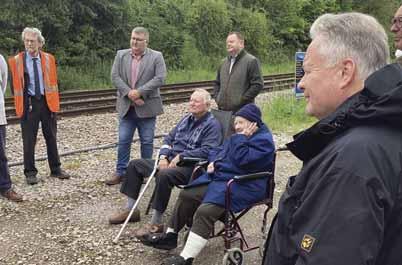
MEMORIAL: Dorothy Buckby at 104 years young along with friends and family members attended a ceremony of remembrance along with Joe Rowberry of Network Rail, RMT Area Health and Safety Representative Derby Paul Shore and railway chaplain Colin Fraser and Gordon Dudman of Leicester and Rutland family history society
widely known was that these deaths and injuries contributed to 263 deaths and 21,098 injuries at work on the railways in 1924 alone. Most of these happened in far less spectacular cases, usually involving individuals – and therefore much less visible and deemed less newsworthy.
Given the nature of the incident, it was one of the three per cent of staff accidents which was investigated by the Railway Inspectorate, the state appointed accident investigators. Inspector JLM Moore thought that Shillaker might have transferred flames accidentally from a lamp lit for testing, via flammable material
on his boots or clothing – but he couldn’t be certain. He put the case down to ‘misadventure’.
Significantly, Moore noted ‘that in spite of the highly inflammable contents of this hut no precautions against fire had been taken, and this feature should receive the early attention of the Company.’ From today’s perspective it seems quite astonishing that such a slapdash arrangement should be possible. Sadly, we don’t know whether or not the LMS made any changes – but the Railway Inspectorate had no power to compel them to do so.
The coroner’s inquest into
Cockerill’s death returned a verdict of ‘accidental death.’ It also added a rider to the findings, suggesting the LMS ‘should issue printed instructions to men working at oil stores’. In both these cases it is interesting that the railway company was particularly singled out for censure, rather than a perhaps easier route of blaming the workers.
Cockerill left a wife and two adult sons, one of whom was also a track worker. Hibbert left a wife and an adult daughter. In theory each family should have received compensation from the LMS, up to a maximum of £300 (around £20,000 at today’s prices). We don’t have the
records to show how much, if anything, was actually paid.
We believe the three injured men returned to work on the railway after they recovered. Incredibly, George Buckby’s daughter, Dorothy, is still alive, and we spoke to her recently. Though only four at the time of the accident, she had clear recollections of her father being brought home, and the burns he suffered. He was seen by the local doctor, who attended every day to dress George’s face – at one point telling him ‘you’re a tough old devil, aren’t you?!’ Dorothy also recalled being told that a spark from a
passing train had set the fire going.
Evidently this was an unusual accident – but it was sort of thing that brought railway worker safety into the public eye, however briefly. The rest of the time it was down to unions like the NUR to push for improvements. The evidence from 100 years ago shows that this was at times a frustratingly slow process, as the railway companies wanted to avoid significant expenditure.
Dr Mike Esbester is co-leader of the ‘Railway Work, Life & Death’ project (www.railwayaccidents.port.ac.uk. Twitter: @RWLDproject).

Amemorialhas been unveiled at Falkirk High Station by former RMT rep Gerry McGann to three rail track workers who were killed in Polmont tragedy in 1983 .
The plaque remembers three men Ian Campbell, 25, Derek Gardiner, 21 and 47-
year-old Gilmour Stillie who died while working on the main Glasgow to Edinburgh line over four decades ago. What began as just another work day for the three track maintenance workers on August 5, 1983 saw them on a stretch of line between Falkirk
High and Polmont Station when they were struck and killed by an empty train travelling at speed.
The track charge hand was thrown to the ground by the train but escaped without significant injury.
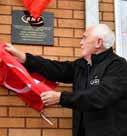
Members should note that in accordance with the Trade Union and Labour Relations (Consolidation) Act 1992 (as amended) RMT is required to hold a review ballot at least every ten years in order that the union can retain its political fund.
Your union is strongly recommending you vote yes.
The ballot will give members the opportunity to vote on whether the union should be able to spend money for political purposes. The law says that the union must have a political fund to do this. RMT will therefore be balloting members on whether or not to maintain the union’s political fund. The ballot will take place between September 16 and October 21, 2024. The
ballot will be a postal ballot and voting papers will be sent directly to members’ homes or to another address which the member has requested the union in writing to treat as their postal address.
Civica will be acting as the Independent Scrutineer and will oversee the conduct of the ballot. Their address is Civica Election Services, The Election Centre, 33 Clarendon Road, London, N8 0NW.
Any member who has changed their home address or wishes their ballot paper to be sent to a different address and has not yet notified the union, should contact the RMT Helpline on 0800 376 3706, or email info@rmt.org.uk
Paddington No.1
branch celebrated Patrick Hayes 50-year membership of the union and was presented with a medallion by RMT president Alex Gordon and general secretary Mick Lynch.
Patrick started on London Transport in 1968 working on the Central Line as a leading railman in various grades as a member of the National Union of Railwaymen (NUR) now RMT.
In 1974 he moved on to British Rail to work on the permanent way and was based at West Ealing depot. In 1978 he moved to West Ealing station as a leading railman covering general station duties including tickets/parcel office and covering the Greenford branch station ticket offices.
In 1982 he moved to Ealing Broadway and in 1994 became a Revenue Protection Inspector based at Paddington. He finished my railway career at Ealing Broadway Station in
2018 working for Crossrail.
“During my 50 Years working on the railway I was a union rep and an activist and now I am a retired Honorary RMT member,” he said.
Mick Lynch said that members like Patrick were the backbone of the union and he wished him a happy retirement after such a long and varied career in the rail industry.
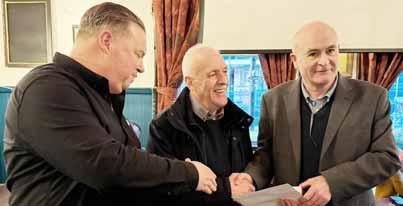





















Better pay with reduced hours
Pensions
Defending jobs
More rights at work
Improved health and safety

Ballot papersmust bereturned by 21st October








